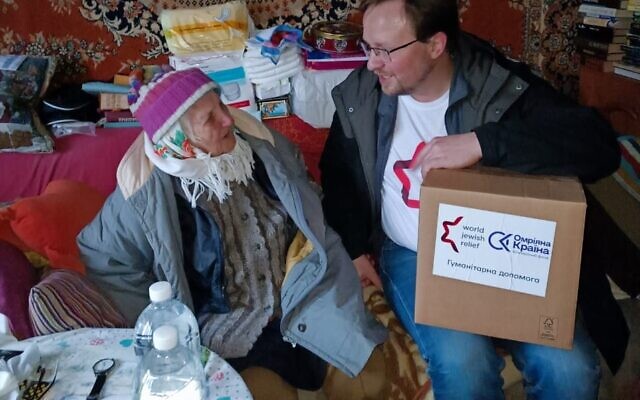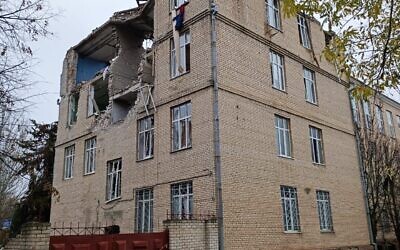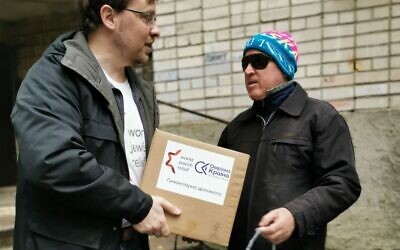‘We never thought it would last this long… we thought it would be over in a month’
The head of a charity working with World Jewish Relief in Ukraine spoke to Jewish News about the future while in London this week

A year ago, when Oleksii Tolkachov began delivering aid to vulnerable Jews and non-Jews affected by the war in Ukraine, he didn’t expect to be doing so a year later, or to be doing so within two miles of Russian tanks firing in his direction.
In London this week for the annual World Jewish Relief (WJR) dinner, the director of the charity’s Ukrainian partner on the ground has spent 12 tough months getting help to those who didn’t or couldn’t leave this time last year.
His staff and volunteers have come within two thirds of a mile of the frontline, darting in and out of basements delivering food and medicines, in places that – a year ago – few of us had ever heard of.
“There are Jewish communities in every major Ukrainian city,” he says. “Ukrainians think of Jews simply as natives of Ukraine. For 1,000 years, Jews have lived in Ukraine, they are part of the fabric of the country.”

Thanks to the generosity of British Jews donating to WJR, his team has got humanitarian support to both Jewish and non-Jewish families caught in the fallout from Russia’s invasion.
“In Kharkiv especially, there is a very big Jewish population, a big cultural centre, one of the biggest synagogues in Europe, it’s a very strong community,” he explains.
“We also help in Kherson, which was occupied by the Russians for several months. Now the Russians are just 2km away, on the other side of the river, shelling constantly, 24/7.

“Leaving the occupied city has been extremely difficult. Those community members who managed to escape, mainly to Odesa, where there is another big Jewish community, have not yet gone back. It is too dangerous. It’s impossible to live there.”
Kherson had a pre-war population of 370,000, he says, including “several thousand Jews”, but now only 30,000 remain. It is “an empty city”, says Oleksii.

WJR is proud to “support a wider audience than just the Jewish community”. As Oleksii explains: “When you work in a war zone, under fire from Russians, you don’t stop to divide families between Jewish and non-Jewish for resources, you simply help those who need it.”
In many of the villages on or near the frontline, “there are no shops, no transport services, no pharmacies”, he says. “Houses are being bombed. These are the people we help. We bring doctors with us. We wear body armour and helmets.
“Our volunteers got 1km from the front-line. I got 4km, in Borova. We were also in Bakhmut [now closed to volunteers owing to the fighting]. The Russians tried to take this city since May. There are still 500 people living there, including 40 children. Our volunteers go to the basement to deliver food, ten minutes, then they go.”

Oleksii worries about the Jews from cities occupied by Russia from nearly a year, including Mariupol and Berdyansk. “We don’t know what happened to them. We know the Russians think Ukrainians are Nazis, even though our rabbis say there are no such problems.”
Oleksii describes several under-fire rescue missions last year.
“Such operations are sensitive, dangerous, expensive, and not official. There are many checkpoints to pass through to get to Ukrainian-controlled territory. Finally, they arrived in Zaporizhia. One woman had life-threatening injuries and needed urgent medical care.”

As for the future, he says: “We need a huge mobilisation of resources because this war became bigger and longer than we could ever have imagined. At the beginning, we thought it’d wouldn’t last this long, maybe a month of so.
“Now it’s a year, it’s a huge problem for us, to feed people, give them psychological support, then – when it’s safe – help them rebuild the country.”
As to the future for Jews in Ukraine, he says: “It would be very difficult to imagine Ukraine without Jewish people, Jewish culture, Jewish traditions, but if we don’t support Ukraine now, many cities will become lost for Jewish communities.
“I saw it in Donbas – a big, rich Jewish community – big synagogues, big cultural centres… they lost everything. They came to other cities to start again. They built a new Jewish town, Anatevka, near Kyiv, then decided to evacuate it. I hope, when the war finishes, Jews will return to Anatevka, and the Jews of Luhansk and Donbas will return home, too.”

Jews around the world are helping Ukraine, he says, in part driven by their values. “Tikkun olam is repairing the world. This is a catastrophic war in Europe in the 21st century and Ukraine is now in major need of repair.”
Britain’s Jews have done much to help already, he says. “When I started to work with WJR, I found that so many Jewish donors had connections with Ukraine, it was a real surprise for me to discover. I never knew.
“Organisations like WJR are supporting not just Jews but all who suffer from unfair aggression from Russia. The most important thing is to stop Russia. Until we do, Ukrainians are very grateful to the Jewish people.
“Jews feel they have a special responsibility to set an example to support people in war. When I came to London, I saw the Kindertransport statue. They understand about war and helping people.”

Thank you for helping to make Jewish News the leading source of news and opinion for the UK Jewish community. Today we're asking for your invaluable help to continue putting our community first in everything we do.
For as little as £5 a month you can help sustain the vital work we do in celebrating and standing up for Jewish life in Britain.
Jewish News holds our community together and keeps us connected. Like a synagogue, it’s where people turn to feel part of something bigger. It also proudly shows the rest of Britain the vibrancy and rich culture of modern Jewish life.
You can make a quick and easy one-off or monthly contribution of £5, £10, £20 or any other sum you’re comfortable with.
100% of your donation will help us continue celebrating our community, in all its dynamic diversity...
Engaging
Being a community platform means so much more than producing a newspaper and website. One of our proudest roles is media partnering with our invaluable charities to amplify the outstanding work they do to help us all.
Celebrating
There’s no shortage of oys in the world but Jewish News takes every opportunity to celebrate the joys too, through projects like Night of Heroes, 40 Under 40 and other compelling countdowns that make the community kvell with pride.
Pioneering
In the first collaboration between media outlets from different faiths, Jewish News worked with British Muslim TV and Church Times to produce a list of young activists leading the way on interfaith understanding.
Campaigning
Royal Mail issued a stamp honouring Holocaust hero Sir Nicholas Winton after a Jewish News campaign attracted more than 100,000 backers. Jewish Newsalso produces special editions of the paper highlighting pressing issues including mental health and Holocaust remembrance.
Easy access
In an age when news is readily accessible, Jewish News provides high-quality content free online and offline, removing any financial barriers to connecting people.
Voice of our community to wider society
The Jewish News team regularly appears on TV, radio and on the pages of the national press to comment on stories about the Jewish community. Easy access to the paper on the streets of London also means Jewish News provides an invaluable window into the community for the country at large.
We hope you agree all this is worth preserving.





















